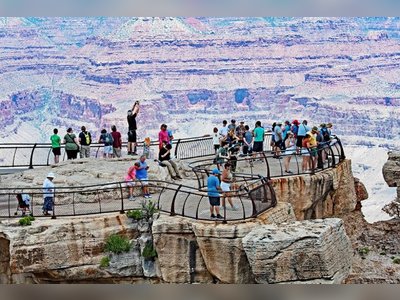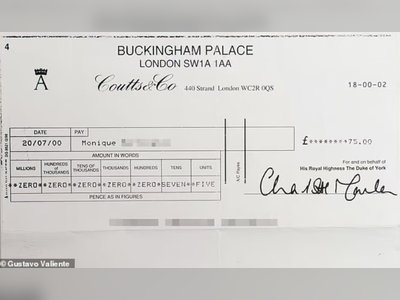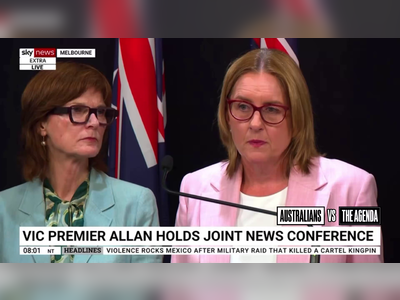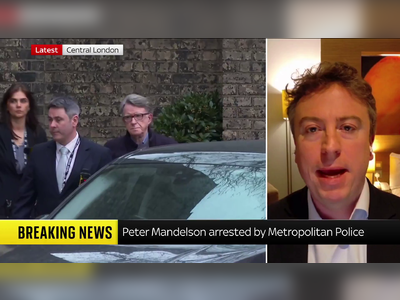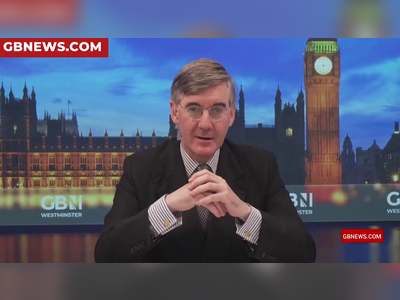UK OFFICIALLY in recession after plunging by shocking 20.4%
Britain has suffered the biggest economic hit from coronavirus of any major economy, figures showed today - with GDP plunging more than a fifth at the height of the outbreak.
UK plc shrank by a shocking 20.4 per cent in the three months to June, the steepest fall in modern history, with record reductions in construction, services and production.
The news means the country is officially in recession - defined as two consecutive negative quarters - for the first time since the credit crunch. The economy had dipped 2.2 per cent in the first three months of the year, and is now smaller than at any time since 2003.
The recession - the deepest in 100 years - is harsher than in every other G7 country, with only Spain affected worse.
However, there was a glimmer of hope with the single month GDP figure for June bouncing back by 8.7 per cent as lockdown restrictions eased.
Chancellor Rishi Sunak said the tumble showed that 'hard times are here' and warned many more jobs will be lost - urging people to get back to offices and help revive the economy.
'I've said before that hard times were ahead, and today's figures confirm that hard times are here,' he said.
'Hundreds of thousands of people have already lost their jobs, and sadly in the coming months many more will.
'But while there are difficult choices to be made ahead, we will get through this, and I can assure people that nobody will be left without hope or opportunity.'
Mr Sunak refused to rule out delaying his crucial Autumn Budget if fears over a second wave of the deadly disease materialise
Boris Johnson has already warned that the country is in for a 'bumpy' ride, but insisted the government is ready to make 'colossal' investments in the future.
In other
Office for National Statistics spokesman Jonathan Athow said: 'The recession brought on by the coronavirus pandemic has led to the biggest fall in quarterly GDP on record.
'The economy began to bounce back in June with shops reopening, factories beginning to ramp up production and housebuilding continuing to recover. Despite this, GDP in June still remains a sixth below its level in February, before the virus struck.
'Overall, productivity saw its largest fall in the second quarter since the three-day week. Hospitality was worst hit, with productivity in that industry falling by three quarters in recent months.'
The plummet is roughly in line with the Bank of England's predictions, but underline that the UK is facing one of the biggest hits among major economies.
Only Spain has fared worse than the UK's overall 22.1 per cent reduction in GDP over the first six months of the year.
Samuel Tombs at Pantheon Macroeconomics said: 'The UK economy has underperformed its peers to an extraordinary degree.'
'The underperformance can be attributed partly to the economy's greater reliance on consumer services spending and the high level of labour market participation by working parents, many of whom have left work to look after children,' he added.
The grim picture emerged after figures yesterday showed that the number of people on company payrolls had fallen by 730,000 since lockdown - with employment seeing the biggest drop in a decade.
In the three months to June, the number in work decreased by 220,000 - the largest quarterly fall since 2009. Total hours worked slumped by a fifth over the quarter to the lowest level since 1994.
Meanwhile, the numbers on payroll tumbled another 114,000 in July, as the claimant count - which includes some people who are in work - increased again to reach 2.7million.
However, analysts warned the grim news is the tip of the iceberg, as the full effects of lockdown have so far been masked by the government's massive support schemes.
Some 9.6million jobs have been furloughed, with the Treasury paying out £33.8billion in subsidies.
Many people appear to have chosen to stay economically 'inactive' rather than hunt for work - meaning they remain outside the headline unemployment figures.
Mr Sunak said the 'outsized' impact on the UK economy was down to the importance of 'social activities'.
'The primary explanation is the composition of our economy. Social activities — for example going out for meal, or going to the cinema, shopping, those kind of things — comprise a much bigger part of our economy than other European countries,' he said.
'So in a situation where you literally shut down all those industries for three months it will unfortunately have an outsize impact on our economy.'
The Chancellor warned it was 'not sustainable' to have 'vast swathes' of the economy closed.
He said: 'It's not a sustainable situation to have vast swathes of our economy essentially shut down.
'And that's why we have been able to successfully reopen bits, and do it in a safe way.
'And as people get back to going shopping, or going out for a meal, or indeed getting back to their office, they will see that it's a new normal, it's a safe normal.'
The Chancellor is believed to be ready to shelve the financial package - billed as the defining moment of the government - if the situation escalates again.
Mr Sunak did not dismiss the idea of rescheduling, but insisted the Treasury was 'very much working towards the goal' of having the Budget as expected.
The contingency planning underlines the anxiety in government about the recent rise in cases across Europe.
A delay would likely be until the spring of next year, and Mr Sunak could instead choose to deliver a 'mini-spending review' before Christmas to update departmental budgets.
One ally of Mr Sunak told the Financial Times: 'While it's very likely to happen, there is an element of uncertainty.
'If we have a series of local lockdowns and a second spike, it's not clear that would be the right time for a Budget.'
Speaking to Sky News today, the Chancellor said: 'We've said that we plan to have a fiscal event in the autumn and we're very much working towards that goal.'
Shadow chancellor Anneliese Dodds said: 'We've already got the worst excess death rate in Europe – now we're on course for the worst recession too. That's a tragedy for the British people and it's happened on Boris Johnson's watch.
'The Prime Minister will say there's only so much he could do during a global pandemic, but that doesn't explain why our economy is tanking so badly compared to other countries.
'It was his government that snatched away wage support for businesses that hadn't even reopened yet. And his government that failed to get test, trace and isolate working despite claiming it's a 'world-beating' system.'
The Bank of England's latest forecast says the economy will shrink by 9.5 per cent this year, making it the worst downturn in a century, and unemployment will rise by a million.
Business groups and economists cautioned the path of the recovery may not be smooth, given the threat of a second wave and possible further lockdowns, with a jobs crisis also on the horizon as Government support measures come to an end.
Melissa Davies, chief economist at Redburn, says: 'There is a long road ahead for the UK economy to claw back its pandemic losses, all the while facing deflationary headwinds from large amounts of spare capacity and job losses.
'As the furlough scheme rolls off, more stimulus will be needed to support household incomes, not least if infection numbers rise in the autumn.'
James Smith, ING developed markets economist, said: 'Rising unemployment is probably the biggest threat to the recovery at the moment, and this is being linked to the gradual unwinding of the Government's furlough scheme over the next few months.
'Many firms, particularly in the hardest-hit hospitality/recreation sectors are still struggling as a result of ongoing consumer caution and social distancing constraints.'
Samuel Tombs at Pantheon Macroeconomics blamed the Government's slow response to Covid-19 for the depth of the UK's second-quarter contraction.
He said: 'The long duration of the lockdown in the second quarter, due to the Government's slow response to Covid-19 in March, followed by its failure to prevent the virus from spreading from hospitals, was at the root of the economy's under-performance in the second quarter.'
He warned the rebound will 'peter out in the autumn' with further lockdowns likely.
He said: 'The planned reopening of schools next month... probably will have to be accompanied by a renewed curtailment of economic activity in the services sector.
'Accordingly, we continue to expect GDP to be about 5% below its pre-Covid peak at the end of this year.'
The Institute of Directors (IoD) and British Chambers of Commerce (BCC) called for Chancellor Rishi Sunak to take further action before the autumn statement to help prevent a disaster for jobs and businesses.
'The battle now is to prevent longer-term scarring from this plunge in economic activity,' according to IoD chief economist Tej Parikh.
He added: 'The Chancellor must respond now with measures to support jobs by cutting the cost of employment, for instance by reducing employers' National Insurance contributions.
'By the autumn, it might be too late to have greatest effect.'
Suren Thiru, head of economics at the BCC, said: 'The prospect of a swift 'V-shaped' recovery remains remote as the recent gains in output may fade over the coming months as the economic damage caused by the pandemic increasingly weighs on activity, particularly as the Government support measures wind down.
'Against this backdrop, bold action is needed to immediately inject confidence back into the UK economy.'
Daily coronavirus cases are above 1,000 again: UK diagnoses 1,009 more people with Covid-19 and confirms 77 further deaths from the disease
More than 1,000 Britons have tested positive for coronavirus in the last 24 hours for the third time in four days.
The Department of Health today confirmed another 1,009 people were diagnosed with Covid-19, meaning the total number of infections stands at nearly 345,000.
Yesterday, the country recorded its highest number of new cases in seven weeks, with 1,148 infections in a single 24-hour period.
Daily cases were slightly lower on Monday (816), but on Sunday they soared to four digits (1,062) for the first time since late June, before lockdown was eased.
Today's new infections take the seven-day average to 1,072, the highest level since the week ending June 24, when there were roughly 1,081 infections a day.
At that point, the country was still in strict lockdown, people were advised to stay at home as much as possible and pubs, restaurants and cinemas remained shut.
The Government's Joint Biosecurity Centre, which has taken a more prominent role in coordinating the Covid response after a series of failings by Public Health England, says daily cases need to be below 1,000 a day to avoid 'flare-ups'.
In recent days thousands of Britons have flocked to beaches and parks to cool off during the sweltering heat, making social distancing largely impossible.
There are now growing fears that the virus is making a comeback in the UK, with Boris Johnson and Health Secretary Matt Hancock warning a fortnight ago that a second wave was on its way from Europe.
But some of the UK's top epidemiologists have repeatedly told MailOnline the climbing rates are simply being caused by an increase in testing capacity, which is skewing the statistics upwards.
The Government also announced that a further 77 people died from the virus in the last 24 hours. It marks the 27th day in a row that Scotland has recorded zero new fatalities. Northern Ireland also reported none.










